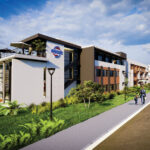AdBlue: rare as hen’s teeth?
AdBlue: rare as hen’s teeth?
The past two years have seen various shortages across the transport industry. It seems that AdBlue is also being hit hard. JACO DE KLERK investigates.
Selective catalytic reduction technologies enable modern day diesel-powered vehicles to produce less harmful emissions. This is done by adding diesel exhaust fluid (DEF) reductants to a vehicle’s exhaust stream to break down nitrogen oxides into nitrogen and water. “These reductants, patented as AdBlue in Europe, can help reduce nitrogen oxide emissions by up to 90%,” highlights US-based supply chain risk analytics company Everstream Analytics, noting that AdBlue is made by mixing a 32,5% urea solution with deionised water.
There is a global shortage of these fluids due to an increase in the price of raw materials, with major exporting countries drastically limiting their offerings to other markets. This acute shortage of DEF poses a threat to the logistics industry and may lead to trucking capacity shortages in the European Union (EU), South Korea, and Australia.
“In mid-October, the German Freight Transport, Logistics and Waste Management Association (BGL) warned of AdBlue shortages and called on the German authorities to act on market stability, both in terms of rising fuel prices, as well as for the price of AdBlue,” expands Everstream Analytics. “Transport operators in the Czech Republic also expressed concerns as distributors reported a 70 to 100% increase in AdBlue demand after several European producers curtailed AdBlue production due to high gas prices.”
According to the Czech Association of the Petroleum Industry and Trade, AdBlue consumption at service stations rose to 10 million litres in the first eight months of last year, an increase of around 135% year-on-year. Similar concerns have also been reported in Slovakia, Slovenia, Poland, France, Italy, and other EU countries.
Everstream Analytics adds that, at the same time, manufacturers of AdBlue in several European countries have reduced or halted production of AdBlue and its raw material, ammonia, due to skyrocketing prices of natural gas – a key feedstock in the manufacturing process. “As a result, prices of DEF have risen significantly. From the beginning of 2021 through November, the price for one litre of AdBlue in Germany has climbed from EUR 0,19 to EUR 0,69.
“BASF, one of the largest chemical manufacturers and the top urea producer in Europe, has recently cut ammonia production at its sites in Ludwigshafen, Germany, and Antwerp, Belgium, due to rising natural gas prices. The company uses natural gas to generate electricity, and as a feedstock to produce ammonia.”
The supply chain risk analytics company notes that Spain’s Fertiberia, a leading fertiliser company in Europe, also halved its production of AdBlue, which led Spanish AdBlue prices to increase by around 50%: “This has placed an additional financial burden on transporters and logistics companies. Production of AdBlue was also curbed at the Yara plant in Italy and the Duslo facility in Slovakia.
“In Asia, many countries do not require the use of DEF for logistics vehicles, as only a handful of economies have transitioned towards the adoption of Euro-6 emission standards. They include Japan in 2014, South Korea in 2015, and Singapore in 2018. Among the countries that require the use of DEF in diesel-powered vehicles, only South Korea is experiencing an acute shortage, as it relies heavily on a single source for its urea imports.”
Since 2013, South Korea’s DEF manufactures have become heavily reliant on urea imports from Indonesia, Bahrain, Qatar, and particularly China for manufacturing processes. According to the Korea International Trade Association, South Korea imported about 66% of its urea supply from China in 2020, a figure that jumped to 97% for January to September 2021.
“On October 14, Chinese customs officials passed a series of legislation that aimed to stabilise the urea market, as prices soared due to high domestic demand and increased manufacturing costs,” says Everstream Analytics. “Fertiliser products and related minerals now require inspection certificates before they can be processed for use or exported. Although the legislation does not indicate an outright ban, it has significantly disrupted the urea exports.”
The shortage of the liquid poses a challenge to the estimated four million registered diesel-powered vehicles in South Korea, of which two million are truck trailers and tankers belonging to the logistics industry.
In Oceania, meanwhile, Everstream Analytics notes that the Australian National Road Transport Association has warned that similar DEF shortages could pose disruptions to the country’s transportation, logistics and agricultural industries.
“We are quickly and actively working to ensure supply chains of both refined urea and AdBlue are secure so that industry can have certainty on their operations,” says Australia’s Minister for Industry, Energy, and Emissions Reduction, Angus Taylor.
“Global supply pressures, stemming from increased domestic use in China, have led to international issues in securing refined urea, which is key to producing AdBlue. This is exacerbated by the global shortage of natural gas, the essential ingredient used to make urea,” he stresses.
The Australian fertiliser manufacturer Incitec Pivot ramped up its production of AdBlue by around 800% at the end of January, and the government Down Under continues to work closely with industry players to bolster DEF supplies for Australia’s transport sector and keep the wheels of its industry moving.
“The company has already ramped up production to over three million litres per week and this milestone is great news. While Australia currently has sufficient volumes of AdBlue to meet its needs, this local production will help restore normal national stock levels,” says Taylor.
But other economies aren’t so lucky. “Disruptions to container transportation could also add considerable pressure to the global freight industry,” says Everstream Analytics. “The lack of cargo vehicles could cause containers to pile up at ports and airports. For South Korea, any prolonged logistics crisis would affect the country’s export economy, reduce consumer confidence, and impact the country’s Covid-19 economic recovery plan. It is estimated that the urea crisis could cost the South Korean economy around EUR 300 million per day in a worst-case scenario.
“The situation could also deteriorate at major European ports and airports against the backdrop of a looming shortage of truckers in Europe and strained supply chains. In Germany, further transportation disruption could exacerbate cargo delays at Frankfurt International Airport – a major cargo gateway in Europe – which has been facing labour shortages and increased inbound volumes since the beginning of October. Similarly, London Heathrow Airport in the UK and Amsterdam Schiphol Airport in the Netherlands have already been under pressure from severe cargo delays in recent months.
“In the event of a severe shortage of urea in Europe, disruptions in the trucking industry are likely to also affect operations at some of the major ports.”
Hopefully DEF won’t become as scarce as hen’s teeth, as this could have disastrous effects for various economies the world over …
Published by
Focus on Transport
focusmagsa




